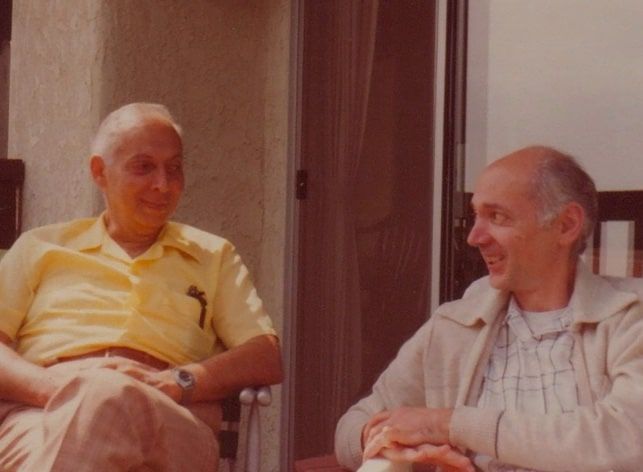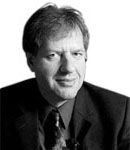A tale of two suspects: ‘Oppenheimer’ versus ‘A Compassionate Spy’
By Hugh Gusterson | August 16, 2023
 A family photo of missile engineer Edward Hall (left) and his brother, physicist and reputed spy Ted Hall, provided to author Dave Lindorff by Sheila Hall, daughter of Ed Hall. The photographer is likely Ed's wife, Edith (deceased).
A family photo of missile engineer Edward Hall (left) and his brother, physicist and reputed spy Ted Hall, provided to author Dave Lindorff by Sheila Hall, daughter of Ed Hall. The photographer is likely Ed's wife, Edith (deceased).
Christopher Nolan’s Oppenheimer is a rich and complex film that will raise different questions in different viewers’ minds. Among them: Was Oppenheimer’s downfall caused by arrogance or naivete? By structural forces or petty personal grievances? Once it was known the Nazis were working on an atomic bomb, did American scientists have any choice but to do the same? Were Gen. Leslie Groves, the director of the Manhattan Project, and J. Robert Oppenheimer, scientific director for the creation of the atomic bomb, asking for trouble by recruiting so many communists and communist sympathizers to Los Alamos? After the success of the Trinity test, was Hiroshima inevitable? And was Oppenheimer realistic in thinking that an arms race with the Soviets might be averted?
In reflecting on some of these questions, I found it helpful to watch Oppenheimer back-to-back with Steve James’ remarkable (and insufficiently noticed) 2022 documentary A Compassionate Spy. (James earlier directed the acclaimed Hoop Dreams). A Compassionate Spy covers much of the same terrain as Oppenheimer, but focuses on a different brilliant young physicist with communist sympathies: Ted Hall. Hall, recruited from Harvard to work at Los Alamos at the age of 18, was the youngest scientist on the Manhattan Project—and, by all accounts, one of the most brilliant. He helped determine the critical mass of uranium in “Little Boy,” the bomb dropped on Hiroshima; he was next assigned to help perfect the implosion mechanism of “Fat Man,” the plutonium bomb design tested in the New Mexico desert, then used in the bomb dropped on Nagasaki. He went on to a distinguished career as a biophysicist in the field of electron microscopy. He may be one of the most important men most of us have never heard of.
Concerned by reports at Los Alamos that General Groves had told a group of Manhattan Project physicists that the “real” target of the new weapon was the Soviet Union, in 1944 Hall and his close friend Saville Sax made contact with the Soviet consulate in New York. They passed along the names of the physicists working at Los Alamos, then gave the Soviets detailed design information about the plutonium bomb. Hall did not know that there was another spy at Los Alamos, Klaus Fuchs, who was independently passing similar information to the Soviets. The details they provided are believed to have expedited the first Soviet test by about two years.* Fuchs was sentenced to 14 years in prison for espionage. US intelligence officials knew that Hall had also spied for the Soviets, but he remained free, eventually moving to Cambridge University in the UK in 1962. He quietly passed away from renal cancer at the age of 74 in 1999. Meanwhile Oppenheimer, who did not spy for the Soviets, was subjected to a loyalty hearing in 1954, stripped of his security clearance, and publicly shamed and disgraced.
How could things turn out that way? And what do they tell us about the US national security state?
The most striking contrast between Oppenheimer and Hall is in their posture toward the US government. Part of Oppenheimer’s hubris, and a key part of his patriotism, was to believe, essentially, that he and the state had merged, that he was so deeply inside the state that, with his charismatic brilliance, he could steer its policies (toward international control of nuclear weapons). While I do not want to give the impression that this was part of some preordained plan, the US government ended up getting Oppenheimer to deliver the Bomb, then threw him away when his counsel was out-of-joint with the sentiments of key officials. Hall, by contrast, never had much faith in the US state, which he suspected was making genocidal plans to wage preemptive nuclear war on the Soviets. (He may have had a naïve faith in the Soviet state, but that is another matter.) So he never sought to change US policy from within; instead, he took matters quietly into his own hands, helping the Soviets develop the Bomb. Hall was never punished for espionage, but Oppenheimer was disgraced merely for giving advice behind closed doors that the United States should pursue arms control and avoid the development of the hydrogen bomb. The US national security apparatus ended up punishing dissent more powerfully than espionage.
Things turned out so differently for the two men in part because of their contrasting strategies for defending themselves when they fell under suspicion. At his loyalty hearing, which was clearly rigged against him from the outset, Oppenheimer relied on his verbal acuity to explain the discrepancies and potentially incriminating facts that inevitably accrue in the file of someone who has been subjected to relentless state surveillance for years. This gave Roger Robb, the prosecuting attorney in the hearing, more material to work with, more cracks to prise open. When Hall was interrogated by the FBI in 1951, he obstinately denied everything and cooperated as a little as possible—the strategy any cop will privately advise. Because the US government did not want to reveal that it was able to decrypt Soviet cables, and therefore could not introduce those cables as evidence in an espionage trial, Hall’s stubborn refusal to confess saved him. It did not hurt that his older brother was one of the leading missile designers in the United States (whereas Oppenheimer’s brother, Frank, though a physicist who worked on the Bomb at Los Alamos, was also a known member of the Communist Party).
While the public rhetoric of the US national security establishment is often absolutist, its private practice can be one of situational ethics. For all that he had done as head of the atomic bomb project, once the Bomb was designed and used, Oppenheimer became expendable and his opposition to the hydrogen bomb an irritant. In the atmosphere of McCarthyism, powerful people who might have stepped up to defend him found it more convenient to keep their powder dry. Meanwhile, Gen. Joseph Carroll, the head of the Air Force Office of Special Investigations, quietly blocked the FBI’s pursuit of Hall, despite strong evidence that Hall had committed treason, fearing that, if publicly found guilty, he would take down with him his brother, a missile engineer who would become known as “the father” of the Minuteman ICBM. This suited others in the intelligence community who saw more advantage in continuing to read Soviet cables than in prosecuting a spy.
The final contrast, and a profoundly ironic one, is between the two physicists’ visions of a future nuclear world order. Oppenheimer, the patriot who was punished, hoped it would be possible to put nuclear weapons and the production of nuclear materials under international control, thus avoiding the perilous arms race that in fact ensued. Hall, an idealist who later said he acted out of a compassionate desire to save the Soviet people from nuclear attack, instead saw deterrence—mutual assured destruction—as the only way forward. The communist idealist turned out to be what, in the lexicon of today’s nuclear debates, would be called a “realist,” more akin to Kissinger than Oppenheimer, Rabi, Szilard and the other Manhattan Project scientists who tried to steer the world away from mutual assured destruction. Ironically, the American communist who committed treason (and got away with it) was in this way more aligned with right than left wing thinking.
As I watched the credits at the end of A Compassionate Spy, I found myself reflecting on an interview I did with an aged Russian nuclear weapons designer in a drab Moscow apartment in the mid-1990s. He had been present at the first Soviet nuclear test in 1949 and had helped design the bomb that was tested. In what was admittedly an inartfully phrased question, I asked, “How did you feel when you realized you had given Stalin the bomb?” He looked at me steadily from under craggy eyebrows as the question was translated, then said evenly, “I felt at last I could sleep again after four years. Finally, we were safe from the Americans.”
This comment would presumably have warmed Hall’s heart. But the fact that we now live in Hall’s world, not Oppenheimer’s, is nothing to celebrate.
* Editor’s note: This sentence has been corrected to say the Soviet test was expedited by about two years, rather than about five. The Bulletin regrets the error.
Together, we make the world safer.
The Bulletin elevates expert voices above the noise. But as an independent nonprofit organization, our operations depend on the support of readers like you. Help us continue to deliver quality journalism that holds leaders accountable. Your support of our work at any level is important. In return, we promise our coverage will be understandable, influential, vigilant, solution-oriented, and fair-minded. Together we can make a difference.
Keywords: J. Robert Oppenheimer, espionage
Topics: Nuclear Risk, Nuclear Weapons
















Fascinating article. So interesting. Truth is much stranger then fiction for sure. You are right living in Hall’s world instead of Oppenheimer’s is not to be celebrated today with the endless number of nuclear weapons floating around in the hands of so many players. Ironically Lise Meitner who was the one who discovered uranium atoms spit with neutron bombardment in the first place and coined the term fission said “I will have nothing to do with a bomb” and adamantly refused to work on the Manhattan project when asked to. On her gravestone. “A physicist who never lost her humanity”.